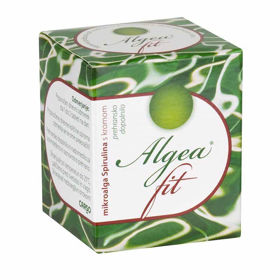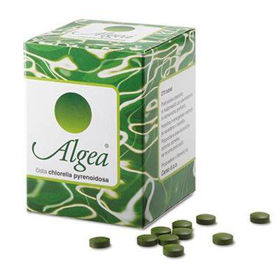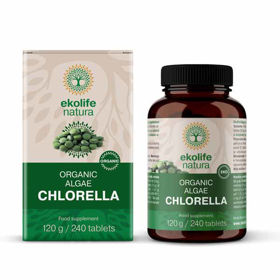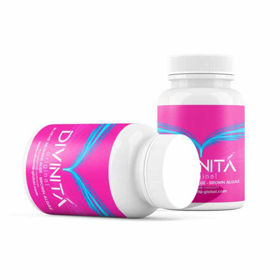Morda bi želeli svojemu jutranjemu smutiju dodali nekaj spiruline, da mu boste pridali čudovito smaragdno barvo in tako povečali količino hranil. Toda ali poznate razloge, zakaj so alge, kot sta spirulina ali klorela, tako dobre za vas? Tu so zdravstveni razlogi, zakaj bi morali v svoj vsakdan dodajati čarobni zeleni prah tovrstnih alg.
Izkoristite moč alg in si pomagajte sami na način, da okrepite imunsko funkcijo organizma pa vse do izostritve duševne ostrine in celo spodbujanja čistosti kože.

Priljubljene vrste alg: klorela in spirulina
Klorela: sladkovodna enocelična alga, ki vsebuje fotosintetične pigmente v svojem kloroplastu, klorela ima napram skipulini več cinka, železa, magnezija, vitamina B2, kalorij, maščob in omega-3 maščobnih kislin. Chlorella vsebuje vseh 9 esencialnih aminokislin, ki jih vaše telo ne more ustvariti samo.
Spirulina: Modrozelena alga (znane tudi kot cianobakterije), je močan vir fikocianobilina. Spirulina je tudi v hranilnih lastnostih podobna kloreli in vsebuje za skoraj 10 odstotkov več beljakovin kot klorela prav tako vsebuje več bakra, tiamina in vitamina B1. Podobno zagotavlja spirulina tudi vseh 9 esencialnih aminokislin, ki jih vaše telo potrebuje za optimalno delovanje.
Čeprav sta obe algi izjemno bogati s hranili, z le manjšimi razlikami, ima klorela rahlo hranilno prednost z višjo vsebnostjo vitaminov in maščobnih kislin. Obe algi kot superhrana odlično dopolnjujeta katero koli prehrano, a ker lahko različno medsebojno delujejo, je le stvar vaše izbire, katero algo dodate v jutranji smuti. Kot vedno se pred jemanjem dodatka iz alg posvetujte tudi s svojim zdravnikom.
Tako gojijo alge - preverite film na povezavi >>
Kakšne so koristi jemanja alg?
1. Alge vsebujejo maščobne kisline omega-3
Ribe veljajo za običajen vir zdravih maščobnih kislin Omega-3. Toda uganite, kako ribe dejansko dobijo to hranilo? Z uživanjem alg!
Študija, v kateri so olje iz alg primerjali s porcijo kuhanega lososa, je pokazala, da imajo vsaka približno enako vsebnost omega-3. Omega-3 je bistvenega pomena za zdravje srca, ob enem pa je bilo ugotovljeno, da znižuje krvni tlak. Dokazano je tudi, da omega-3 povečajo dopamin in modulira depresijo.
2. Alge prinašajo esencialne aminokisline
Obstaja malo živil na rastlinski osnovi, ki lahko zagotovijo vseh devet esencialnih aminokislin, ki jih vaše telo potrebuje, vendar spirulina in klorela vsebujeta vseh devet. To so izolevcin, levcin, lizin, metionin, fenilalanin, treonin, triptofan, histidin in valin. Te aminokisline prispevajo k številnim bistvenim funkcijam v telesu, kot so obnavljanje tkiva, absorpcija hranil, ustvarjanje mišic in okrevanje po poškodbah. Potrebujete jih in uživanje alg je odličen način, da jih dobite.

3. Preprečevanje bolezni
Po podatkih zaupanja vredne študije naj bi klorela pomagala pri težavah bolezni srca in ožilja ter ob enem tudi pri težavah zamaščenih jeter, kar je posledica visoke vsebnosti karotenoidov in rastlinskih sterolov. Raziskave so tudi pokazale, da ima spirulina številne pozitivne lastnosti: V študiji 87 ljudi s predrakavimi poškodbami ust na dan je ob zaužitju 1 grama dodatka spiruline izginilo 45 odstotkov lezij preiskovancev.
Glede na poročilo, ki ga je objavil Center za razvoj raka Memorial Sloan Kettering, ima lahko spirulina zelo obetavne učinke. V laboratorijskih poskusih je kalcijeva spirulina, ekstrakt spiruline, modulirala podvajanje virusa HIV, virusa herpes simpleksa, citomegalovirusa in virusa gripe - imela je učinkovito podporno terapijo.
4. Alge spodbujajo zdravo kožo
Spirulina pomaga modulirati prehiter propad celic, kar lahko pomaga telesu v procesu regeneracije. Prav tako lahko prepreči prekomerno razraščanje kandide, kar pomaga koži okrevati po izpuščajih in izbruhih aken.
Chlorella vsebuje hranila, ki so ključnega pomena za sintezo kolagena, ta pa spodbuja zdravo, elastično in enakomerno kožo. Kot je bilo omenjeno v tej študiji iz leta 2016, naj bi klorofil v kloreli telesu celo pomagal odpraviti številne posledice, ki nastanejo na račun sevanja.







 Facebook
Facebook
 Instagram
Instagram
 info@moja-lekarna.com
info@moja-lekarna.com

